Peter MALONE
Saturday, 09 October 2021 13:00
Lost Girls
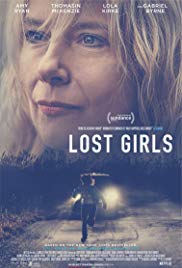
LOST GIRLS
US, 2020, 95 minutes, Colour.
Amy Ryan, Thomasin Mc Kenzie, Gabriel Byrne, Lola Kirke, Oona Laurence, Miriam Shor, Reed Birney.
Directed by Liz Garbus.
This is a quite effective re-creation of murder cases in the first decade of the 21st century, a story of an unidentified Long Island serial killer.
The film focuses on Amy Ryan as Mari Gilbert, a woman who has had a hard life, given her daughter up for government care, raising another two daughters, trying to find continued work. Is the kind of role that Amy Ryan is particularly effective in. Her eldest daughter has left home and is a prostitute. She promises to come for a meal but does not appear which leads Mari Gilbert to investigate her disappearance, a hard woman, making continued demands on all the people she encounters, the girl’s boyfriend, the girl’s driver, the police who are not sympathetic.
Gabriel Byrne appears as a retiring investigator who does show some sympathy for Mari and works for the investigation.
The prostitute disappeared from a gated community and there are some suspects, especially a doctor who declares that he worked for the rehabilitation of young women. His testimony is inconsistent.
However, in the search, the bodies of four other prostitutes are found, mothers and sisters coming to Long Island, holding a vigil for their dead loved ones. Maria and her daughters participate. The older daughter, Sherre, played by Thomasin Mc Kenzie (Jo Jo Rabbit, The King, True History of the Kelly Gang) also investigates and shares with the mothers and sisters of the dead girls.
A year after these investigations, authorities are persuaded to clear a very difficult would and swamp area and the skeleton of Marie’s daughter is found. Information at the end of the film indicates that the crimes have not been solved. In the screenplay is particularly critical of the slow action of the police.
1. The title? The subtitle about the unsolved American case? Based on facts? The final information about the case, campaigning, Mari Gilbert and her daughters, her death?
2. The New York State setting, the town, the diner, home? The Long Island settings, the gated community, the police precincts, the woods and forests? The musical score?
3. The theme of Beautiful Dreamer? During the credits? Shannon as a little girl and singing it?
4. Mari Gilbert, tough, tough-minded, dealing with her daughters, hard, not expressive in love, concern about Shannon, looking forward to her coming, her missing the meal, making excuses? Her background, young, giving up Shannon, Shannon and her being bipolar? Working hard, the diner and her shifts? Perpetually angry?
5. The portrait of the daughters, Sherre, her age, concerns, reactions to Shannon, support of her mother, involved in investigations, talking with the young people, the younger sister, mental condition?
6. Mari, searching for Shannon, her own investigation, the demands on people, going to see the boyfriend and his explanation, going to see the driver and his description of what happened? The phone call from the doctor? The later discussions with him, his denials? Going to see the police, her being put off, the continued demands, the inspector and his dislike of her? Meeting Richard, making demands on him?
7. The search, the finding of the four bodies? The four prostitutes? The arrival of their families, mothers and sisters, the background of the girls, the relationship with their families? The celebration of the vigil? Mari and her being different, her daughter being missing rather than dead, the daughters and their participation in the vigil? The sympathetic mother, alienate it from the daughter, a good listening ear and comfort for Mari?
8. Mari and her continued demands, the interviews, the doctor, the gated community, concerns, the criticism of the late arrival of the police, the quick arrival with complaints from the community? The doctor, his alleged phone call, his status, wife, rivalries and leadership in the community, his concern for girls in trouble?
9. Richard, his situation, about to retire, dealing with Mari, able to do things, unable? His farewell celebration?
10. The year passing, further developments, non-developments, the women arriving for another vigil? Mari going? Meeting Richard, the discussions? The persuasion to look into the difficult area, clearing it, finding the skeleton, Mari going, looking, her daughters looking?
11. The satisfaction of Mari knowing that her daughter was truly dead?
12. The role of the media?
13. The subsequent investigations, stalling, no solution? The film’s critique of the slowness of work of the police, and some seeming lacking interest?
Published in Movie Reviews
Published in
Movie Reviews
Saturday, 09 October 2021 13:00
Running with the Devil
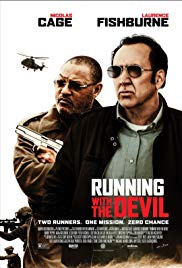
RUNNING WITH THE DEVIL
US, 2019, 90 minutes, Colour.
Nicolas Cage, Laurence Fishburne, Barry Pepper, Adam Goldberg, Leslie Bibb, Cole Hauser, Natalia Reyes Gaitan, Clifton Collins Jr, Peter Facinelli.
Directed by Jason.Cabell.
Yet another of the many Nicolas Cage films during the 2010s, sometimes six year, most of them action shows – and most of them having a rather manic performance from Cage himself. As here.
However, there is some intrinsic interest in the plot. It goes back into the 1980s and the movement of drugs between Latin America and the United States. It employs maps throughout the film indicating the various steps in the transportation of the drugs, by planes, by vehicles, by boats… The route leads from Bolivia up into Mexico and, with some deviations, to various locations in the United States.
There are some drug investigators, played by Leslie Bibb and Peter Faccinelli. However, the main attention is given to those involved in the transportation, the big players and dealers, the small players, the drivers, pilots, local farmers who execute workers.
Nicolas Cage portrays, along with Cole Hauser, one of the main supervisors of the traffic, involving his going to the various destinations, testing the product, confronting difficulties.
Laurence Fishburne, on the other hand, is involved both with the authorities and with the dealers, spending a lot of the time drug-fuelled along with his friend, played by Adam Goldberg, and some prostitutes, a number of whom finish up dead.
For some the interest in the film will be the participators at each stage, the covers that are used, the vehicles, those involved, the dangers, deaths.
Barry Pepper plays the overall control.
There are complications at the end with confrontations between Cage and Fishburne, once friends, finally confronting each other with some of the drugs that are demanded by the boss. Cage goes over a cliff with Fishburne refusing to help him. While it does seem a surprise for Nicolas Cage to go out of the film substantially before the end, we have been deceived, of course, and he doesn’t die from his fall but returns for a final violent confrontation with Fishburne.
Some different material but, generally, the expected violent style.
Published in Movie Reviews
Published in
Movie Reviews
Saturday, 09 October 2021 13:00
Girl on the Third Floor
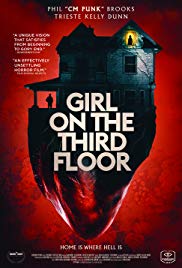
GIRL ON THE THIRD FLOOR
US, 2019, 90 minutes, Colour.
Phil Brooks (C.M.Punk), Trieste Kelly Dunn, Sarah Brooks, Travis Delgado.
Directed by Travis Stevens.
Perhaps the point of including this film on this site is that it is a statement that this is a film that need not be seen.
The plot is rather laborious as it tries to be a horror film, an ex-convict going to redecorate a house that used to be a brothel (and seems to be haunted by past spirits), to make a new life for him and his pregnant wife. However, the house seems to have a mind of its own or is operated by the previous inhabitants and so continually hinders the rebuilding and redecoration.
Phil Brooks is a former wrestler (C.M.Punk), who had a successful career in the ring but does not transfer to an acting career very well at all. His very stilted. He is also covered in tattoos from his wrestling days. It is very difficult for audiences to identify with him, or even be interested in his character.
As might be expected, a girl from the past arrives to seduce him, other spirits from the past also appear – with the wife eventually turning up, encountering the women, encountering some of the previous customers, and finding her husband dead, killed off by the plot but somehow rather a ghostly surviving within the walls of the house.
There is also a character, a female minister of the local church who knows the secrets and discusses them with the builder and then with his wife. But, it looks as though they have to find out the truth by themselves.
Perhaps this description gives the film more attention than it deserves.
Published in Movie Reviews
Published in
Movie Reviews
Saturday, 09 October 2021 13:00
Boy Next Door, The/ 2015
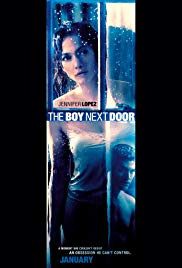
THE BOY NEXT DOOR
US, 2015, 91 minutes, Colour.
Jennifer Lopez, Ryan Guzman, Ian Nelson, John Corbett, Kristin Chenoweth, Lexi Atkins, Hill Harper, Jack Wallace.
Directed by Rob Cohen.
Not a romantic comedy. Rather, it comes from the early years of Blumhouse productions who came into their own several years later with some classic horror stories including Get Out and The Invisible Man.
This is the kind of erotic comedy that could be described as trashy – and Jennifer Lopez did get a Razzie nomination for her performance. If many audiences were set a task to write a screenplay about a sinister but charming-looking boy next door and an older woman about to divorce her husband, most would come up with something like this.
Jennifer Lopez teaches classics, including Homer, at the local college. Her husband, John Corbett, has been unfaithful on his work travels. The couple separated. They are both devoted to their son who has respiratory problems and is bullied at school. A young man, the type who is often described as a hunk, arrives next door after his parents have died, with excellent references from his previous school. He has come ostensibly to look after his ailing uncle.
Of course, he infiltrates the family, a moment of seduction with the mother, further alienating the son from his father, brutal in comments at first towards the father.
The young man is revealed as obsessive and, as the film progresses, beyond obsessive. He puts the mother into all kinds of compromising situations, even for disturbing her classroom with 100 or more photos of their sexual encounter which he had also videoed. He fakes an application to be in her class, further turns the son against his father, giving up his love for computers to take on boxing. There is a scene at school where the next door boy is extremely violent when the son is attacked in the corridor. Also in the picture is the vice principal, played by Kristin Chenoweth, who was the confidante of the mother but, ultimately, challenging the young man and suffering for it.
There is also a scene where the father takes his son on a driving lesson – and, of course, the brakes have been cut. The mother later is suspicious and checks with a mechanic about the young man’s parents dying in a similar kind of accident.
The film builds up to a highly emotive, highly violent confrontation with the family, the young man obsessed still despite all the violence. It takes a while for the father and son, tied up, to be free and to help their mother in the middle of a conflagration to defeat the boy next door.
New paragraph surprisingly, the film was directed by Rob Cohen, director of a number of action films and the originator of the Fast and the Furious franchise.
Published in Movie Reviews
Published in
Movie Reviews
Saturday, 09 October 2021 13:00
Between Worlds
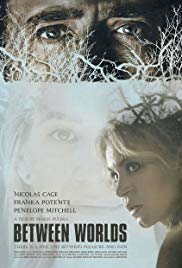
BETWEEN WORLDS
US, 2018, 90 minutes, Colour.
Nicolas Cage, Franka Potente, Penelope Mitchell, Garret Clayton, Hopper Penn.
Directed by Maria Pulera.
Yet another of the very many films that Nicolas Cage makes each year, often six. As with so many of them, there are quick action films, he appearing as somewhat manic.
On the one hand, this has a very complex plot. On the other hand, the drama does not move very rapidly.
Cage portrays an out of work truck driver who encounters a woman being strangled. It turns out that she has had a near death or death experience (seen during the opening credits as she drowns) and that this gives her some kind of power to help her daughter who has been involved in an accident. The daughter recovers and goes home for recuperation.
Needless to say, Cage and the woman, played by German actress, Franka Potente (Run Lola Run) become involved. The daughter seems to be jealous. However, the complication is that cage’s dead wife is somehow rather present in the daughter and he is resuming his relationship, sexual relationship with her. And she is more than a touch jealous! And this involves the daughter’s two rather hippy friends with some violent results.
It is probably fair to say that the film is not particularly engaging for an audience – who might find either the topic or the treatment (or both) have touches of the absurd.
Published in Movie Reviews
Published in
Movie Reviews
Saturday, 09 October 2021 13:00
Honeyland
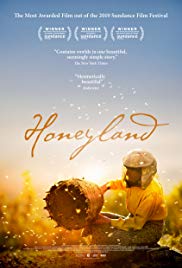
HONEYLAND
Macedonia, 2019, 85 minutes, Colour.
Directed by Tamara Kotevska and Ljubomir Stefanov.
Macedonia is probably not on the beaten track of many travellers around Europe. Here is an opportunity for a visit, mainly to the striking and sometimes barren countryside, an excursion into the city of Skopje, looking modern, avenues, shops…
This terrain is not exactly what one might immediately identify as Honey land. Yet, the background of this story is the production of honey, the work of a peasant woman in her mid-50s who stays at home looking after her enfeebled 85-year-old mother.
This is a film with the main appeal to those who love documentaries. It has won many awards and was Oscar-nominated not only for Best Documentary but also for Best International Film.
On the one hand, there are scenes of Hatidze, the honey producer, in the mountains, discovering hives in the Cliff rocks, cultivating them, at home with the bees. But, there are even more scenes of her at home, single with no children, tending her mother, feeding her, washing her, rousing on her at times but continually devoted to her. While the mother is alert, she has memory lapses at times and gets confused. The continued dedication of daughter to mother is moving and admirable.
As the story goes on, we see much more of Haditze. She is comfortable bargaining with the honey sellers in the city. And she buys some hair dye, wanting to look nice – although her facial bone outlines look rugged, she has had no dental help, generally appearing as stern.
However, a family turn up in a caravan, driving cows – which provides a striking scene of a calf being born, one of the children almost drowning, all kinds of domestic sequences and farm sequences, the mother exasperated and firmly believing in capital punishment for unruly children. Yet, Haditze befriends them all, shows a delightful maternal side in playing with the children.
But, the father of the family, is an opportunist, listening to all the discussions about the honey, the production of the honey, the high quality, the income. He tries to do a deal with Haditze agreeable but, with the help of his family and some associates, he takes over the whole honey producing business. And Haditze’s mother dies.
So, there is a certain moroseness about the story, the effect on Haditze, losing her business, the family moving on, alone in the mountains.
While there will be a certain appeal to beekeepers, this is really a story of a culture that is unfamiliar to most audiences, an interesting example of ethnographic documentaries.
Published in Movie Reviews
Published in
Movie Reviews
Saturday, 09 October 2021 13:00
All the Bright Places
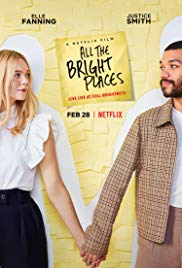
ALL THE BRIGHT PLACES
US, 2020, 107 minutes, Colour.
Elle Fanning, Justice Smith, Alexandra Shipp, Kelli O' Hara, Lamar Johnson, Virginia Gardner, Keegan- Michael Key, Luke Wilson.
Directed by Brett Haley.
This film is based on a young adult novel, perhaps geared towards younger adults, written by Jennifer Nevin who co-wrote the screenplay.
It is a serious look at adolescents and their problems, with a message at the end referring audiences who have experienced a disturbance by the themes to consult the film’s webpage.
Elle Fanning plays, Violet, the younger sister of a woman who died in a car crash. She is distinctly disturbed by the death of her sister, her best friend. She contemplates suicide. Justice Smith portrays a young student, Finish, who frequently runs, finds Violet on the bridge and is able to bring her down. He continually intervenes in her life, helping her, going out with her, bike riding, eventually persuading her to overcome her apprehensions and get into a car, sharing a partnership in a school project to visit sites in Indiana.
However, he also has deep problems, memories of the cruel father, sharing life with his sister, being uncooperative with his counsellor (Keegan- Michael Key), considered by the others at school as a freak. He has many post it’s on his wall, often urging him to be awake.
The friendship blossoms but Finch disappears for days at a time, which makes Violet anxious. They have shared the happy visit to a pond and, when he disappears after a vicious fight with a student in the corridor, defending Violet, Violet goes to the pond and finds his clothes.
The film finishes with his funeral – and the message for any audiences who are anxious after sharing the experience of the film.
1. The title, bright places, right places? Wrong places?
2. The Indiana setting, the town, homes, school, roads, overpass and bridge? The range of countryside, the highest place in Indiana, the rollercoaster, the pond for swimming, support group meetings? The musical score?
3. A film for young adults? The younger adults? The information at the end about young people, mental disturbance, suicide?
4. Finch, age, running, seeing Violet, on the bridge, urging her down, his humorous dramatics? The background to his own life, stories about his father and cruelty, the support of his sister? The discussions with the counsellor, his lack of cooperation? At school, Violet dropping her books and his making the commotion? The sites of Indiana, his proposal to work with Violet? The song, deleting it for her? The gradual meetings, the bike rides, gaining her confidence? Yet his own background and students calling him a freak?
5. Violet, age, the story of the accident, her sister’s death, the effect on her, standing on the bridge, Finch saving her? At home, her parents, the cake for her sister’s birthday? The later apologising for insensitivity? At school, her friends, urge to go to the party, upset and leaving? Finch and the song, her wanting him to delete it? Gradually getting to know him? The outings, talking, smiling, not wanting to go into a car, riding the bikes? His sleeping on the lawn and introduction to her parents?
6. The teacher, the class, the proposal about the project and the sites of Indiana?
7. The excursion, the highest point of Indiana, the humour, the countryside, the jump from the monument stone? The further rides together? Finch proposing they go to the rollercoaster, driving carefully, her becoming more comfortable in the car? The exhilaration of the rollercoaster?
8. The outings together, kissing, feelings towards each other? Going to the pond, the swimming, Finch’s story about the boys disappearing, the background of his holding his breath in the bath and his going underwater, Violet upset?
9. The night out together, the sexual encounter? Her parents upset with Finch?
10. Violet and her friends, meeting Finch’s friends, their continued friendship with him, his disappearances, their explanations, Violet’s anxiety, phone, not answering, suddenly reappearing at her parents’ home?
11. Finch and his mental condition, his wanting to keep awake, his room, the post-its? Tearing them down? Discussions with his sister about their father, his regrets? The cut on his side?
12. The advice of the counsellor, the group meeting, Violet’s friend and her talking about suicide?
13. The fight with the boy in the corridor, his being vicious? Violet’s disappointment?
14. His disappearance, Violet going to the pond, his clothes, gone? Her grief? The support of her parents? The funeral?
15. The sadness of the film, people reaching out to help, Finch and his ability to help others but not himself, leading to suicide?
Published in Movie Reviews
Published in
Movie Reviews
Saturday, 09 October 2021 13:00
Never Rarely Sometimes Never
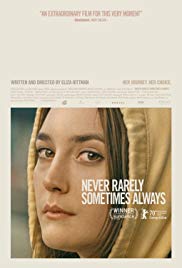
NEVER RARELY SOMETIMES ALWAYS
US, 2020, 101 minutes, Colour.
Sidney Flanigan, Talia Ryder, Theodore Pellerin, Ryan Eggold.
Directed by Eliza Hittman.
The list in the title comes from a questionnaire presented to a young client by a counsellor wanting to gauge whether the client has experienced sexual violence. It certainly draws attention to issues of sexuality, violence, relationships, emotional damage.
In many ways this is a very plain film, some commentators calling it a return to neo-realism. It does not draw attention to itself in flashy style, rather presenting the characters, their situations, their dilemmas, their challenges, decisions and action.
We are introduced to Autumn, a 17-year-old from Pennsylvania, participating in a talent show. She is not particularly good and there are some hackles from the audience, applause from her family. At the celebration afterwards, she is very moody. The young man at another table taunts her with some lewd gestures. She throws a glass of water over him. So, this is Autumn.
Autumn works as a checkout assisted in the supermarket, along with her cousin, Skylar. At home, Autumn gets on well with the rest of the family as can be except for the taunts from her father. Skylar notices something wrong – and the theme of the film emerges. Autumn is pregnant.
Which leads the film into considerations of abortion, Autumn going to local help centres, having a pregnancy test, ask questions for and against abortion. She decides her, however, to go to New York City to a more professional centre and is accompanied by Skylar who has taken a wad of money from the supermarket takings she was handing in.
The film is very matter-of-fact in its presentation of the situation, not taking any particular moral stances, perhaps a reflection of the secular society in which the Western world lives. Autumn is treated well by the women who interview her, counsel her, explain the procedures, offer the chance to her to withdraw from the process.
The process actually requires the couple to stay overnight in New York City and they try to find ways of surviving of getting some money.
Nor does the film dramatises the abortion experience in any sensational way. Whether people approve or not, this is a process, this is the experience, these are the consequences, these are the effects. Which means that the film, which supports abortion, can be viewed by audiences who approve of or disapprove of abortion, an opportunity to look at the human experience side as well as the moral principle side.
1. The title? The questionnaire for the client? The tone?
2. Pennsylvania background, homes, clubs, clinical centres? The transition to New York City? The streets, accommodation, the clinics, the abortion centres? The musical score?
3. Introducing Autumn, the various items at the talent show, her singing, mournful, the power of love, domination? The heckler in the audience? Her family applauding her? The aftermath, her mood, the criticism by her father, her mother praising her, the other members of the family? The young man and his suggestive attitude towards her? Her throwing the water over him?
4. Autumn as a person, age 17, at school, minimal ambitions, working at the checkout? Her friendship with Skyler, her cousin, Skyler as concerned, noticing Autumn’s attention? The work in the supermarket, the request to leave early, refused? Skylar being sick?
5. Autumn, awareness of the pregnancy, her going to the centre, the welcome, the discussions, protesters against abortion, documentary film? The test, the same as from the supermarket? Its being positive?
6. The issue of the abortion, Skylar taking the money at the supermarket, giving it to Autumn? Their going to New York, the train?
7. Autumn, moods, uncertain, straightforward in her decisions? Going to the New York clinic, the warm reception, the various guides, interviews, testing about her decision, testing about any violence towards her? The film’s title and the questionnaire? Her definite answers – although the hesitation about some sexual violence towards her?
8. The two-day procedure, Autumn agreeing, the need to stay overnight, Skylar and her continued support? The flirtation? Getting the money?
9. The return, the nursing staff, the procedure, all presented ordinarily?
10. The aftermath, feeling uncomfortable, yet well, Skylar and her support? The decision to go home?
11. The realism of the characters, the situations? The issue of abortion, for and against? In a secular society and context?
Published in Movie Reviews
Published in
Movie Reviews
Saturday, 09 October 2021 13:00
Persian Lessons

PERSIAN LESSONS
Russia/Germany/Belarus, 2020, 126 minutes, Colour.
Nahuel Peres Biscayart, Lars Eidinger.
Directed by Vadim Perelman.
Persian Lessons is an unusual or unexpected title for a film about Nazis, Jews, concentration camps during World War II. It states that it is based on a true story.
While the story is intriguing in itself, the film is very strong on showing the callousness of the ordinary German soldiers, men and women, doing their duty with loyalty to Hitler, killing without any strong sense of destroying another human being, going off to be entertained as they dominate the prisoners.
Argentinian actor, Nahuel Peres Biscayart, plays Gilles, son of a rabbi, imprisoned in Belgium, allegedly to be transported but actually to be shot. In the back of the truck, he encounters another prisoner who is starving who begs him for his sandwich. He does give it and receives in return a book in Farsi that the other prisoner had picked up after a Persian family had been taken.
Gilles is shrewd and is able to survive for some time in the camp, producing the book, claiming that it was his, and that he had Persian ancestry. As happens, one of the officers commanding (a mixture of the cruel and the foolish), Koch (Lars Eidinger), remembers his brother who refused joining the Nazi party and went to open a restaurant in Teheran. He now wants to learn Farsi in order to be ready to go to Teheran after the war. Gilles offers a wonderful opportunity for him to learn the language.
On the one hand, there is a lot of farce as Gilles, sometimes with difficulty, especially in remembering the language and words he is creating, agrees to teach Koch Farsi, a few words at a time, then many words. Koch has sacked the female officer who was copying the names of prisoners into the register and Gilles gets the job, working part-time in the kitchen as well, living in the barracks.
This means that the audience sees the range of life in the concentration camp from the point of view of the officials, from the point of view of the workers, life in the barracks as well as in the quarries and the hardships of rock breaking.
Needless to say, there are some close moments at times but Gilles devises a clever way of inventing words by taking the first part of the surname of the prisoners and nominating a meaning!
With ups and downs, this continues for several years until the allies advance on the camp, Gilles finally taking on his Jewish identity and marching away with the condemned, Koch disguising himself and there are some very funny sequences, as might be anticipated, as he tries to talk to Allied officials with his years of learning Farsi vocabulary!
There must always be stories of World War II, of the Holocaust – this one is certainly arresting and rather different.
1. The title? A true story? Nazi Germany, concentration camps? The exotic Persian and Farsi background?
2. Another war story, Germans, Jews, Nazi behaviour, prisoners in camps? The issue of freedom? Variations on the well-known stories?
3. 1942, France, the roundup, the prisoners and vehicles, getting out, leaving the luggage, being suddenly and brutally shot? The reaction of the Germans and their killing?
4. The situation, Gillrd, in the train, the Jewish background, Rabbi father, having the sandwich, the prisoner’s appeal, Gilles giving it to him, getting the book in return, the dedication and his assuming that identity, abandoning the suitcases, the lineup for being shot, Gilles and his shrewdness, falling before the firing, his claiming to be Persian, the proving it,F speaking Farsi, Bayer and his reaction, reporting to Koch, the cans of meat as motivation, yet his suspicions?
5. Gilles’ character, his age, experience, intelligence, able to conceal the truth about himself, creativity and lies, adopting the identity, going to the barracks, assigned to work in the kitchen?
6. Koch, cruel, the executions, self-importance? His background as a chef? His joining the Party, his brother escaping, going to Teheran, his intentions of learning Farsi, after the war going to Teheran and setting up a restaurant? His dramatising the seeming callousness of the Nazis and the military, no remorse in killing?
7. The camp, the military, the women, enters into the log? The Commandant and his attitude? Bayer and the other soldiers, relationships, sexuality, jealousies? Plans and counter plans? Intrigues – and being sent to the front in Russia?
8. Koch, his desire to learn Farsi, his wariness, but believing Gilles, threats, getting him to work in the kitchen, but also copying the files?
9. The title of the film, the Persian lessons, the words, genial and his inventing them, Koch writing down, the limited number, rehearsing, the increasing number, caution his demands, Gilles having to learn the language he was creating and to use it? The transition from cooking to copying the documents, so neatly? His brainwave in using the names of the log to invent falsehoods?
10. Time passing, Koch learning, even writing a poem in the alleged Farsi, conversations? Bayer and his continued suspicions? The jealous former copyist? Giving Gilles the rubbish, an opportunity to escape? Gilles and the decision to return? The danger of the same word for bread and tree, his explanation? Sending him to the quarries and the harsh breaking of rocks? His collapse, hospital? Koch pardoning him? Koch and his explanation of the situations to the commander?
11. The war continuing, the women and their plans, and his plans, the gossip about the commander on sexuality? Using it to protect himself?
12. The approach of the Allies, the Germans burning all the documents?
13. The food, the Italians in the camp, Gilles getting the food for them, Koch allowing it? The confrontation in the barracks, the Italian giving his life?
14. Gilles and his escape plan, Koch and his plan, using the papers? Gilles and his putting on the Italian jacket, identifying as a Jew, Bayer telling Koch that he was leaving? Koch pursuing? Gilles continuing, his escape?
15. The humour and irony of Koch explaining his Ffarsi, and the interpreters commenting on his gibberish?
16. Gilles, with the Allies, the interrogations, his ability to recite from memory, with the association for words, the thousands of names and dates in the files?
17. The different war story?
Published in Movie Reviews
Published in
Movie Reviews
Saturday, 09 October 2021 13:00
Pinocchio/ 2019

PINOCCHIO
Italy, 2020, 124 minutes, Colour.
Roberto Benigni.
Directed by Matteo Garrone.
For older audiences and for younger audiences who watch television or DVDs, Pinocchio is the character from Disney’s 1940s celebrated animation film (with its key song, When you wish upon a star, playing behind the beginning of every Disney program and its logo). Pinocchio is the wooden puppet, created by the carpenter, Gepetto, who encounters all kinds of adventures as he wants to become a human boy, famous for his nose getting longer every time he tells a lie. And, there is his advisor, Jiminy Cricket.
Italian audiences may be well familiar with the Disney version but, in the early 2000’s, there was a version with Roberto Benigni – which was not received well.
However, here is Roberto Benigni again, with a chance to show his comic talents as well as his capacity for pathos, playing the role of Gepetto. While that makes a lot of sense, it is a surprise, especially for serious film buffs and critics, that this version has been directed by Matteo Garrone, best known for his serious dramas and exposes of the Mafia, Gomorrah and, more recently, Dogman.
In many ways, this is a lavish production. It recreates an atmosphere of the 19th century, elaborate sets for a local village, homes, shops and a visiting circus of marionettes. It goes out into the countryside, explores a mansion, rounds up the lost boys and takes them to an island where they become donkeys, takes us to a farm, takes us into the sea. No question that a lot of detailed attention has been giving to sets, costumes and décor.
What needs to be said is that it is very, very Italian in its style, emotions, and more emotions. While an Italian sensibility will respond well, it may well be too much for audiences which with more restrained sensibilities who may feel it goes over the top many times in its action, in its dialogue and humour.
The main ingredients of the traditional story are certainly present – though the cricket advisor is rather more serious, no Jiminy Cricket from Disney. There is the young Princess who befriends Pinocchio. There are the comic villains of the piece, Fox and Cat, con artists with smooth tongues and no moral values. The master of the marionette circus is sympathetic as is a farmer later in the film where Pinocchio works the waterwheel to earn his living. The man who rounds up the boys with the pretense that they will find a land where they can play forever but who turns them into donkeys and sells them in the market is a dastardly type.
And, there are strange creatures, the other marionettes who come to life, the dowager who is also a large snail, the friendly tuna trapped in the shark.
So, in this context, what is Gepetto like? His rather like Roberto Benigni, poor, trying to persuade the locals to hire him for wood repairs, entranced by the idea of creating a puppet, of becoming a father figure, searching for his lost puppet.
And, main question, what is Pinocchio himself like. As regards the visuals, his wooden face, his limbs (carelessly burning of his legs with his feet in the fire), his clothes, he is believable given the context. But, he is continually wilful, easily led, truant going to the circus, on his adventures, deceived by Fox and Cat, charmed by the Princess but still walking away, with the lost boys, discovering how to earn his living on the farm, wanting some coins to recompense Gepetto, finally realising that Gepetto is a father figure.
One hopes that a wide audience will enjoy this re-telling of the story – but, there is the reserve of wondering how the Italian sensibility will travel worldwide.
1. The popularity of the story? Familiar? The books, the Disney film, the earlier Benigni film?
2. The work of the director, his insights into crime and the Mafia? Change of tone?
3. 19th century Italy, the settings, the atmosphere, the town, homes, shops, the circus of puppets? Moving to the countryside, forests, mountains, the sea, the island, the mansion? A fairytale world, Italian style? The musical score and themes?
4. The adaptation of the fairytale? The blend of the real and fantasy? Ge[etto, in the town, the circus coming, his idea about creating a puppet, the woodcarver and the moving block, giving it to Gepetto? The puppets, alive, a fantasy for all ages? The Princess, the lady snail, the death rabbits, the Fox and the Cat, the lost boys becoming donkeys, the market the donkeys, the owner, the talking tuna, the farmer? The range of characters and images?
5. Pinocchio Gepetto human, the make up, wooden, limbs, idiosyncrasies?
6. Gepetto, poor, hungry, offering to fixed tables, the gift of food, at home, the idea of the puppet, the magic wood, his sculpting? The torso, limbs? The coat from the bedspread?
7. Pinocchio, as a puppet, wooden, his face, eyes, limbs? Burning his legs in the fire? Wilful, anti-authority? The spelling book, going to school, rushing to the circus? His love for Gepetto, calling him Babbo, nevertheless leaving? The master of the circus, the other puppets welcoming him, benevolent master, sneezing freeing Pinocchio and giving him the
coins?
8. The cricket, his appearance, continued warnings and reappearance?
9. Pinocchio and his telling lies and his nose getting longer? The birds coming to peck the extra nose? The encounter with the Fox and the Cat? Sinister, their story, befriending Pinocchio, the lies, the tree giving money, greedy and having their nibbles, abandoning Pinocchio and letting him pay? Finding him, the burying of the coins and their disappearance? Their hanging him? The return, the Fox and his play, accusing the Cat? Pinocchio learning and rejecting them?
10. His wandering, the encounter with the princess, friendship with her, the matron and the snail, life at the mansion? Yet his going off, leaving the Princess, eventually returning, finding her older, nice, her love for him, playing and mischief? Yet leaving again?
11. The boy and tempting Pinocchio to go to the island for continual play? The master, there all turning into donkeys, the market, Pinocchio sold, the hard work, returning to normal and his escape?
12. Sympathetic farmer, the waterwheel and Pinocchio’s working, earning his keep, the money for Gepetto?
13. Into the sea, swallowed by the shark, the tuna and its friendliness, the chats? Finding Gepetto? With the fire, alive? Having searched the world? The decision to escape, Gepetto not swimming, Pinocchio saving him? The tuna the farewell?
14. The house in the countryside, his turning into a real boy, the support of the Princess? The happy ending?
Published in Movie Reviews
Published in
Movie Reviews